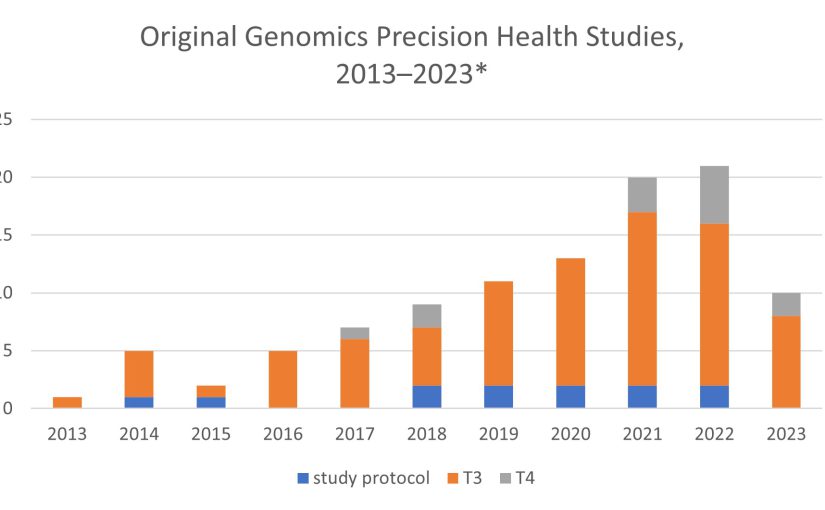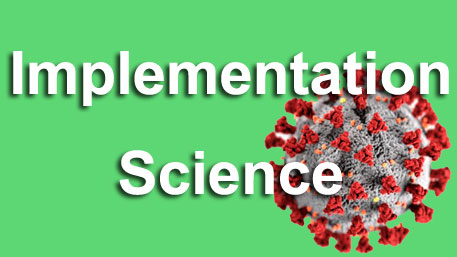Search Results
10 results for implementation science
Tracking the Contributions of Implementation Science to the Population Health Impact of Genomics and Precision Health: A New Knowledge Base

Successful implementation of evidence-based genomic and precision health interventions requires an understanding of what works and what doesn’t work within the context of various clinical and public health settings. Research and evaluation that incorporate implementation science tools and methods into the translation of these interventions facilitate this. Here we present a new CDC knowledge base,
Posted on by 1 CommentUsing Implementation Science Frameworks in Genomics and Precision Medicine: We Can Do Better!

A recent scoping review identified many structured approaches to the implementation of genomics and precision medicine and limited use of implementation science frameworks. With continuous advances in genomics and accelerated translation from discovery into clinical practice, in our blog posts, we have repeatedly examined the crucial importance and emerging role of implementation science in the
Posted on byPredictive Analytics, Implementation Science, Precision Medicine and Precision Public Health

This blog is a summary of our recent paper based on a multidisciplinary workshop convened by the National Heart, Lung, and Blood Institute to explore enhancement of predictive analytics for implementation research. The use of predictive analytics in precision medicine (the right intervention to the right patient at the right time) is well established. The
Posted on byToward More Precision in Implementation Science in the Age of COVID-19

Implementation science (IS) is “the study of methods to promote the adoption and integration of evidence-based practices, interventions, and policies into routine health care and public health settings to improve the impact on population health.” The various factors that must be taken into consideration in designing, conducting, and evaluating IS studies dictate an inherent “precision”
Posted on byImplementation Science to Improve Case Finding, Cascade Screening, and Treatment for Familial Hypercholesterolemia: A Prototype for Precision Public Health Research

Familial Hypercholesterolemia (FH) is a common genetic disorder, affecting more than 1 million people in the United States. FH causes lifelong high levels of low-density lipoprotein cholesterol, and if untreated, leads to a high risk of premature coronary heart disease. Most patients with FH are undiagnosed or inadequately treated with regular or high-intensity statins, leaving
Posted on byImplementation science and genomic medicine in action: A case study

There is an urgent need for researchers and implementers of genomic medicine to incorporate implementation science into their translational research efforts. Implementation science is the study of methods to promote the adoption and integration of evidence-based practices, interventions, and policies into routine healthcare and public health settings to improve our impact on population health. But
Posted on byStimulating Implementation Science in Genomics and Precision Medicine for Heart, Lung, Blood and Sleep Diseases: The Case of Familial Hypercholesterolemia

Implementation science is an emerging field of scientific inquiry that has been increasingly applied to genomics and precision medicine. In our recent papers on the state of scientific publications and NIH funding, we have identified areas of growth and limitations of the field and called for more training and workforce development for implementation science in
Posted on byIf You Build It Will They Come? The Urgent Need for Implementation Science in Genomic Medicine

As the evidence base for genomic medicine grows, evaluating and implementing genomics to improve health care and population health remains an ongoing challenge. There is no guarantee that “if we build it they will come,” paraphrasing the well-known expression from the movie, Field of Dreams. To improve adoption, uptake and sustainability of genomic medicine applications,
Posted on byImplementation Science in Genomic Medicine: Why we need it now!

With the launch of the precision medicine cohort initiative, All of UsSM Research Program, the importance of incorporating implementation science in genomic medicine is greater than ever to ensure population health benefits for all. Historically, the speed of genomic discovery has far exceeded the time required to put these potentially life-saving medical discoveries into practice.
Posted on byPrecision Medicine, Implementation Science and Public Health: How Do We Scale Up From 1 Million to 300 Million?

Planning for the 2015 Presidential Precision Medicine Initiative is in full swing. After the initial announcement in January 2015, several workshops were held to help in design and execution of the longitudinal cohort study of 1 million persons. The workshops covered important topics including a Building a Precision Medicine Research Cohort, Scientific Opportunities, Digital Health Data,
Posted on by 1 Comment

